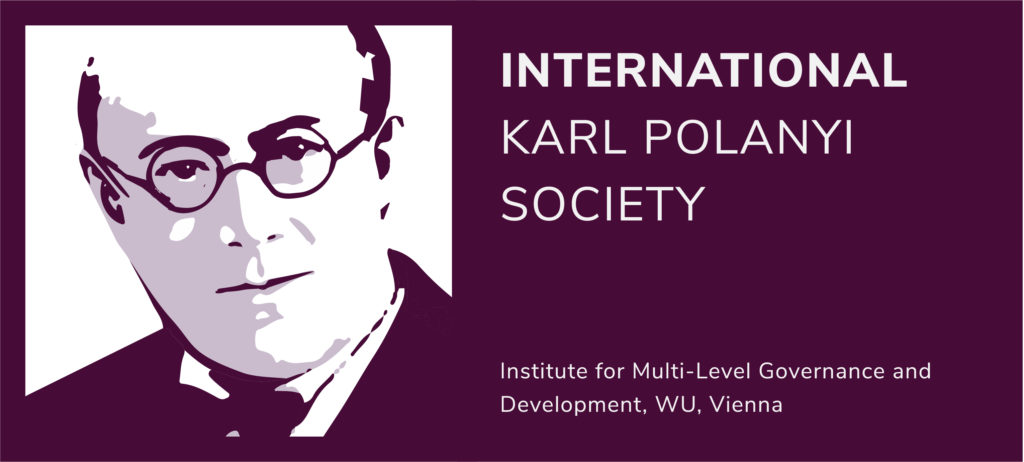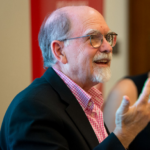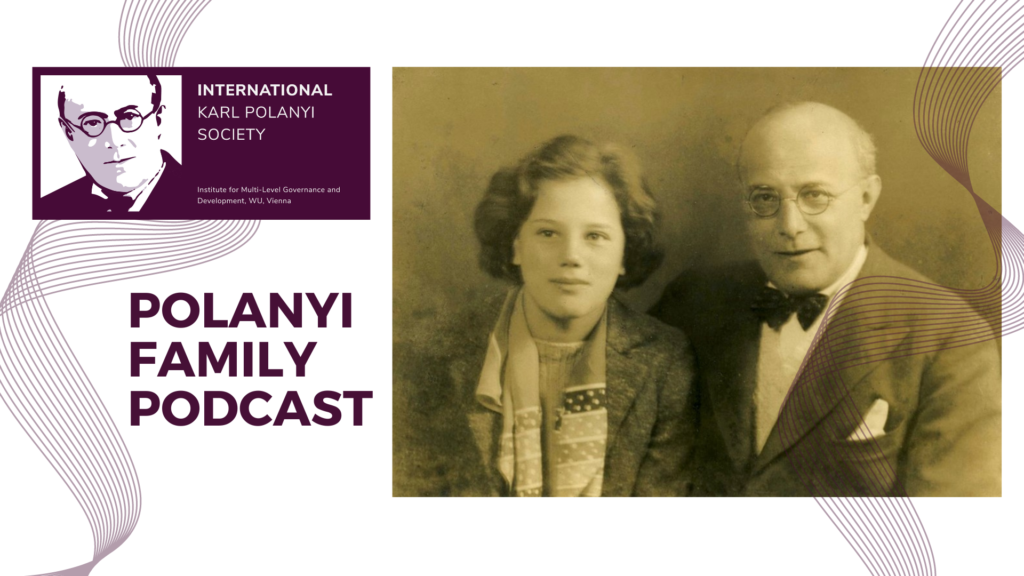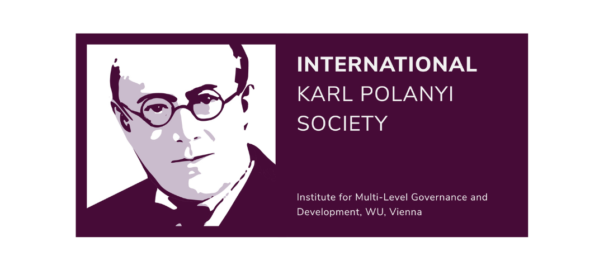
Category Archives: Media

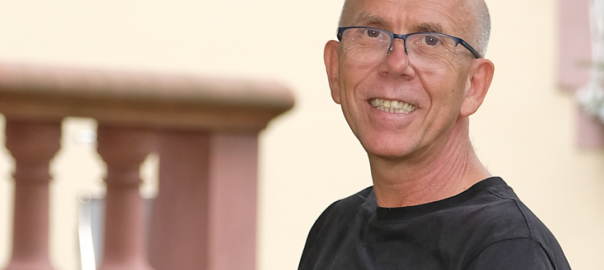
Our 7th Karl Polanyi Visiting Professor!
announcement:
Attila melegh is our 7th vienna karl polanyi visiting professor
January 29th, 2024
We are happy to announce Professor Attila Melegh as our seventh Vienna Karl Polanyi Visiting Professor for the summer term 2024!
In the course of his visit to Vienna, he will hold a PhD-seminar, an Internal Workshop at Central European University and an open lecture traditional to our visiting professorship.
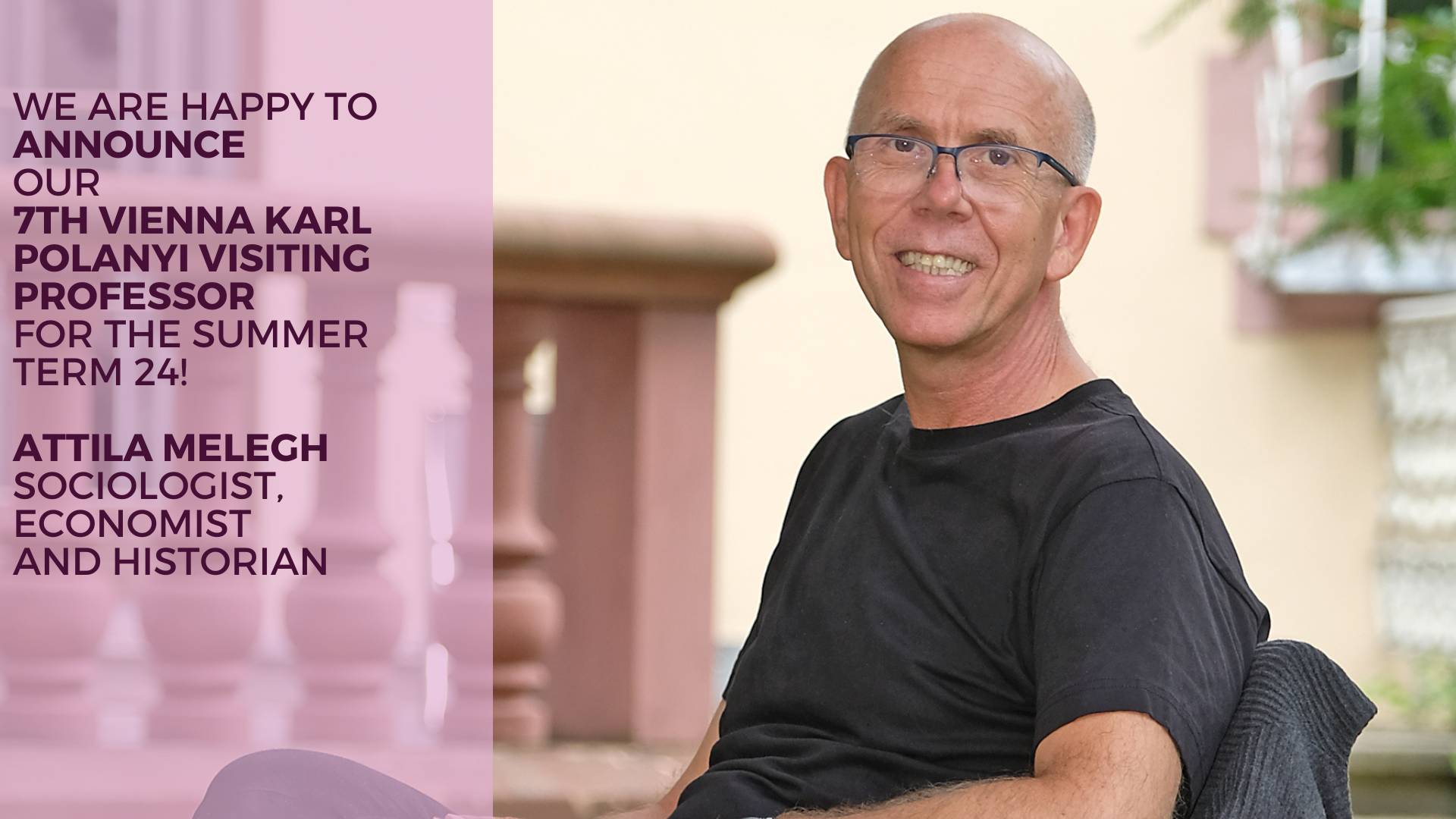
Public lecture - MAY 22 - SAVE THE DATE!
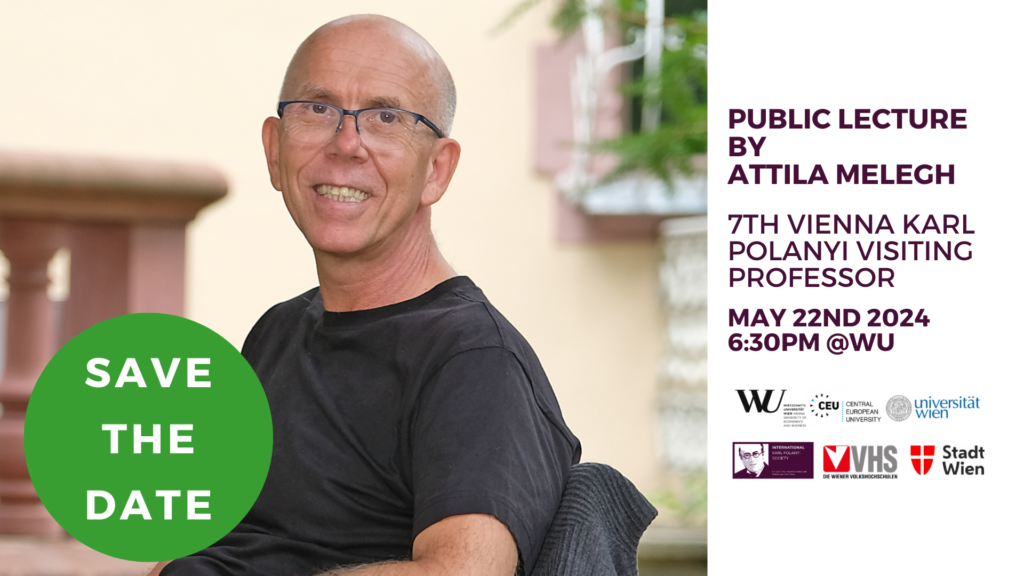
phd seminar - application phase open now!
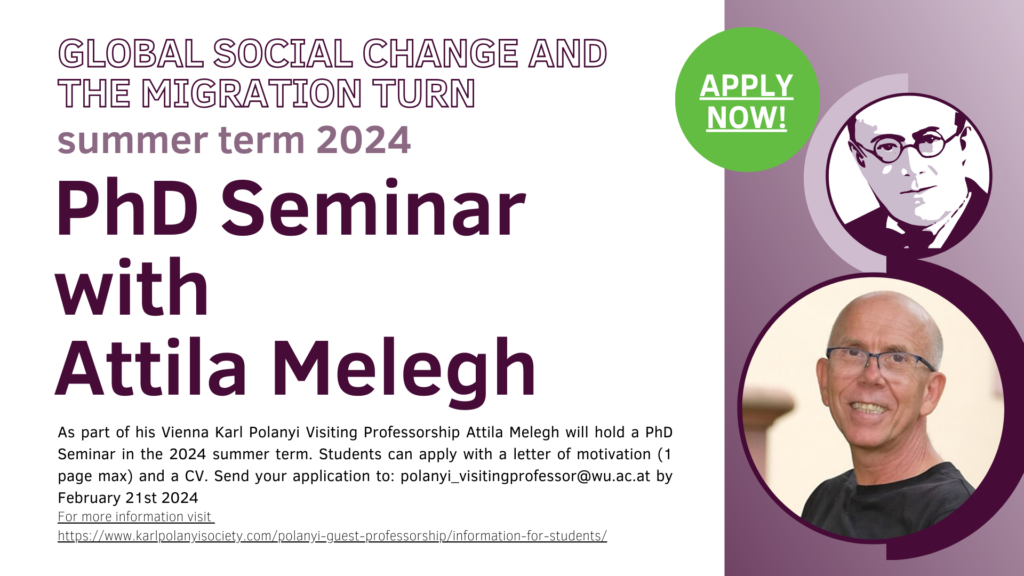
workshop @ CEU
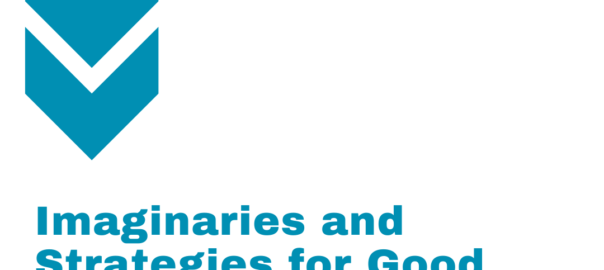
CONFERENCE & CALL FOR PAPERS
Imaginaries and Strategies for Good Care and Good Housing in Times of Transformation
December 22nd, 2023

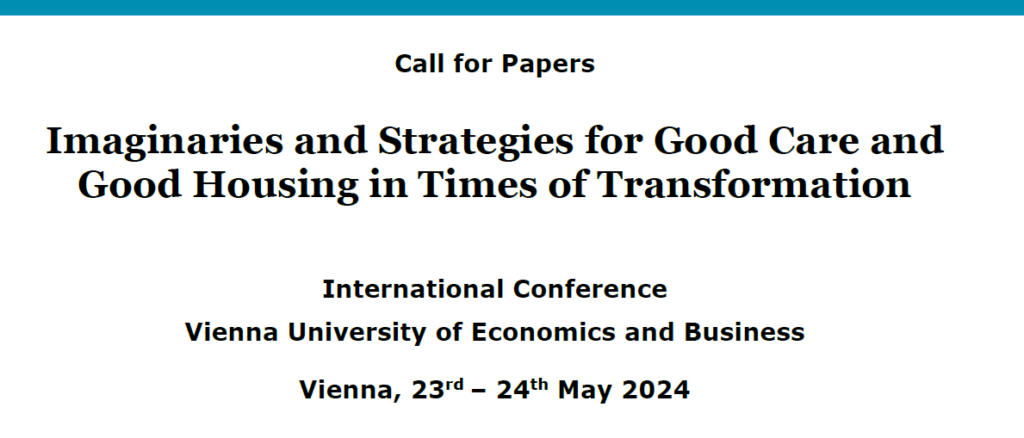
CALL FOR PAPERS
Care and housing are key provisioning systems, intertwined and coconstitutive.
They contribute to sustaining livelihoods and are foundational for human
flourishing. Care, on the one hand, is not restricted to one’s own place of living, but
shapes and is shaped by spatial relations in specific localities or transnational
networks. Care and Care work is provided in a specific built environment with different
configurations of housing, depending on appropriate infrastructures, including
buildings, retail, green and leisure facilities. Housing, on the other hand, is always
entangled with care – not only for others, but also for one’s own habitation, the
residential environment, and local communities. As it offers the material place for
diverse reproductive activities, the care (work) taking place in the respective spaces
is disarrayed when housing becomes unaffordable or precarious. In addition, how
neighbourhoods are developed, and how other key provisioning systems (mobility,
health, food, energy, etc.) are organised, decisively influences the capabilities of
residents to give and receive care and to shape the respective environment by ‘doing
housing’. Last but not least, the provision of care and housing, are both closely
entangled with specific society-nature relations that enable more or less reciprocal,
just, and sustainable practices of doing care and housing.
In the ongoing social-ecological, geopolitical, and digital transformations care and
housing are decisive but contested terrains for shaping new arrangements of
organizing livelihoods. As multiple crises escalate, it becomes increasingly harder
to ensure human flourishing without exacerbating mechanisms of exclusion or
transgressing planetary boundaries. Currently, diverse struggles unfold about
reinforcing or changing existing forms of provisioning, (dis-)empowering actors – be it
as residents, workers, care-receivers and givers, family members or migrants. It is,
thus, urgent to identify pathways to develop and shape ongoing transformations in an
inclusive and sustainable way. While profound change is unavoidable, collective actors
in the 21st century have to explore new imaginaries as well as strategies to actualize
such visions. This includes struggles over private and public spaces, about
transforming private practices as well as forms of collective agency.
Why a conference on imaginaries and strategies for good care and good
housing?
The conference aims at discussing these contested developments in the fields of care
and housing and envisioning future perspectives. Imaginaries are necessary to
identify desirable futures of how societies can re-organise the foundations of our social,
economic, and ecological systems. Aiming at a good life for all within planetary
boundaries, including good care and good housing, is a widespread, but ambitious
objective for ongoing transformations. The community shift and tendencies toward
communitisation, within care regimes, aims at prefigurative forms of such
provisioning. Community-oriented arrangements can be based on reciprocity and
redistribution, that facilitate human flourishing, even under adverse framework
conditions of financialization and austerity. However, these community initiatives are
strongly interrelated with the welfare state and different modes of care and housing
provision, with professional, and lay work etc. They facilitate desirable practices of
doing care and housing in niches of the given provisioning of social services and beyond
and are more or less able to change “the rules of the game”. Multiple strategies are
necessary to identify the potential for actors to change these framework conditions,
be it institutions (e.g., social infrastructures, legal and fiscal systems) or structures
(e.g., gender relations) to transform contemporary financialised capitalism. Currently,
economic and social policies are still subordinating the reproductive sphere to the
sphere of production, commodification and finance, and short-term consumer wishes
to long-term needs of sustaining the social and ecological background conditions of
our civilisation. Actualizing visions of a care-ful future will, therefore, only be possible
if the always-contested relations between the productive and the reproductive sphere
are re-organised – at the expense of the former. Such re-organisations will be conflictprone,
often negotiated in uneven relations and on multiple levels simultaneously –
from the home and the neighbourhood to the region, the nation, and the EU.
Against this background, the conference “Imaginaries and Strategies to Transform
Care and Housing in Times of Transformations” seeks to problematise these
transformations and their diverse manifestations to envision imaginaries and
strategies that foster socially just and ecologically sustainable ways of living together.
Of particular interest is research that relates transformations in the provisioning of
care and housing to other provisioning systems, for example mobility or health
services, as well as to society-nature relations that facilitate remaining within planetary
boundaries.
The conference is organized in three tracks:
1.) transformative imaginaries for good
care and good housing;
2.) transformative strategies for a good life within planetary
boundaries;
3.) a transdisciplinary track on ‘Wirtschaft neu denken [Re-thinking the
economy]’ (in German).
Academic contributions are invited to all tracks, practitioners to the third track.
• Track A: Transformative imaginaries for good care and good housing:
o Imaginaries for Caring Futures in Careless Times: What does good
care and good housing mean in socioeconomic systems of the 21st
century? How can a socioeconomic system beyond growth promote wellbeing?
How can we ensure that care and care work become visible and
socially recognised? How can we imagine caring/care-ful neighbourhoods
or even societies in the future?
o Hybrid Economic Models: How can we imagine alternative mixed
economies bridging the gap between centralised planning and freemarket
coordination? How can we better integrate hybrid forms of
provisioning (market, reciprocity, redistribution, household)? How can
socioeconomic systems be democratised to empower citizens and
workers to shape the framework conditions for living and working, caring
and dwelling in a just and sustainable way?
o Balancing Productive and Reproductive Capacities: How can we
reorganise the economy to better secure its reproductive foundations?
How can this contribute to creating a more equitable society?
• Track B: Transformative strategies for good care and good housing:
How can desirable alternatives become feasible futures?
o Strategies for Caring Futures in Careless Times: How can public
policies prioritise foundational goods, services, and infrastructures?
Which structures facilitate and which structures hinder the provision of
good care and good housing while maintaining decent working
conditions? Which actors promote, and which actors hinder its
provisioning?
o Multi-level Transformations: How can diverse actors at multiple levels
contribute to just and sustainable transformations? What is the potential
of bottom-linked niche alternatives (e.g., caring communities, cohousing)
and of top-linked changes of framework conditions (e.g.,
comprehensive decentralised care services, rent regulation)? How can
we avoid becoming trapped in societal niches and what forms of multiscalar
economic reorganisation are necessary?
o Finding Common Ground: How can we build broad societal alliances
and reconcile social and ecological politics? How can we bolster
participation in decision-making processes? What are the limitations of
consensus-based policy proposals? Which innovative policies exist? How
can reproductive activities be fostered and reproductive workers
empowered?
• Track C: ‘Wirtschaft Neu Denken [Re-thinking the Economy]’:
transdisciplinary dialogue on imaginaries and strategies to embed the market
into society-nature relations that strengthen reproductive systems and
foundational goods, services, and infrastructures to enable a good life for all
within planetary boundaries.
o Transversal theory-practice dialogue during all decentral sessions
o Diversity of practitioners and activists
o Workshop design
Abstract submission:
We invite researchers and practitioners to submit an abstract (250-300 words and full affiliation of the
author/s) by February 17th 2024 and will inform you about the acceptance of your paper by by 1st March 2024. Please send your submissions to contestedcareandhousing@wu.ac.at.
Conference Tracks A and B will be in English,
Track C will be in German.
Travel and accommodation costs will not be covered by
the organisers; there are no conference fees.
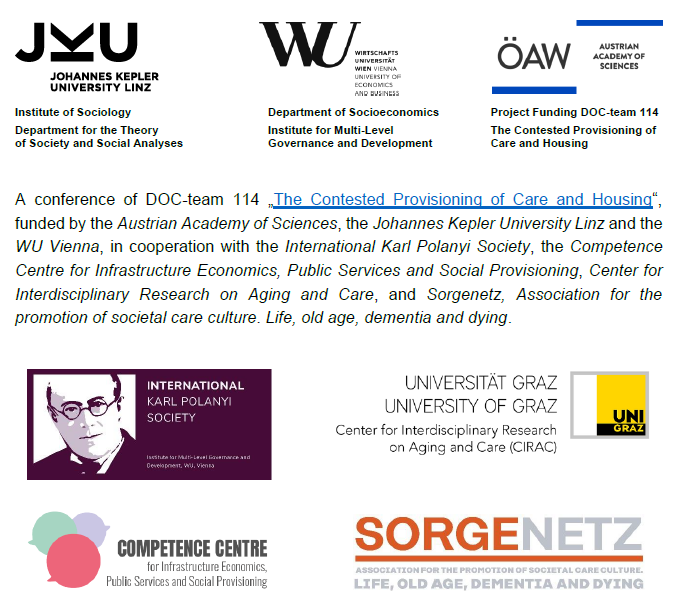
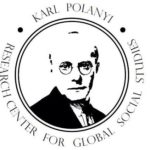

“Imaginaries and Strategies for Good Care and Good Housing in Times of Transformation”
The conference aims at discussing these contested developments in the fields of care and housing and envisioning future perspectives. Imaginaries are necessary to
identify desirable futures of how societies can re-organise the foundations of our social, economic, and ecological systems. Aiming at a good life for all within planetary
boundaries, including good care and good housing, is a widespread, but ambitious
objective for ongoing transformations.
17th FEBRUARY, 2024
Submission Deadline
We invite researchers and practitioners to submit an abstract (250-300 words and full affiliation of the
author/s) by February 17th 2024 and will inform you about the acceptance of your paper by by 1st March 2024. Please send your submissions to contestedcareandhousing@wu.ac.at.
Conference Tracks A and B will be in English, Track C will be in German.
Organised by:
Johannes Kepler University Linz,
WU Vienna,
Austrian Academy of Sciences – ÖAW,
University of Graz,
Competence Centre for Infrastructure Economics, Public Servies and Social Provisioning,
Sorgenetz
Organizers and chairs:
Brigitte Aulenbacher
Andreas Novy
Valentin Fröhlich
Benjamin Baumgartner
Florian Pimminger
Hans Volmary
Administration:
Julia Fankhauser
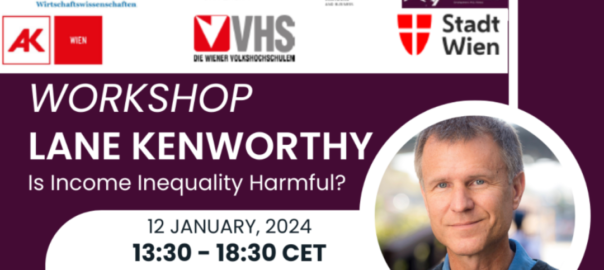
Register for Lane Kenworthy’s Workshop @CEU
Guest professor LANE Kenworthy's WORKSHOP @CEU:
'Is Inequality harmful?'
November 30th, 2023
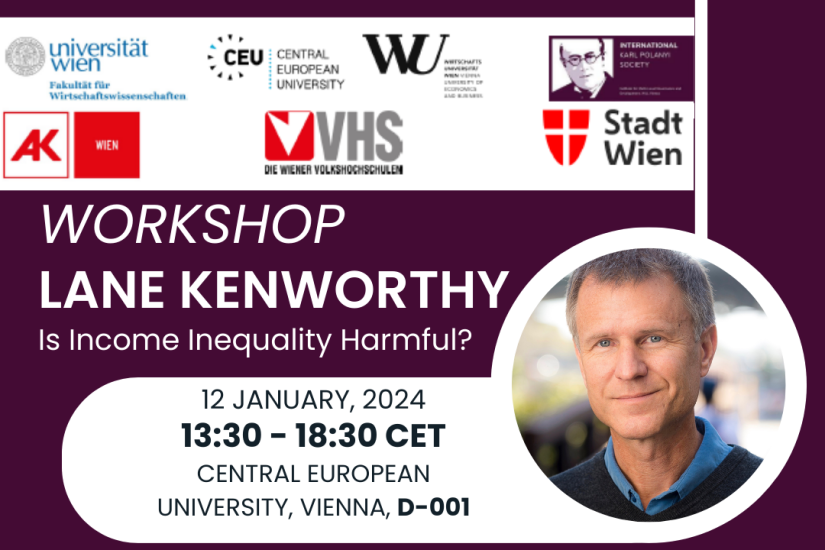
Join the workshop!
The Department of Political Science at Central European University & the Vienna Karl Polanyi Visiting Professorship Team invites you to a Workshop with Lane Kenworthy, Yankelovich Endowed Chair Professor (UC San Diego) and Vienna Karl Polanyi Visiting Professor.
Is Income Inequality Harmful?
13:30-18:30 CET / January 12, 2024
COMMENTATORS /
- Despina Alexiadou, University of Strathclyde
- Jürgen Essletzbichler, Wirtschaftsuniversität Wien
- Judith Derndorfer, Wirtschaftsuniversität Wien
- Alice Kügler, Central European University
- Björn Bremer, Central European University
MODERATORS /
- Carsten Schneider, Central European University
- Anıl Duman, Central European University
Please register here by January 10.
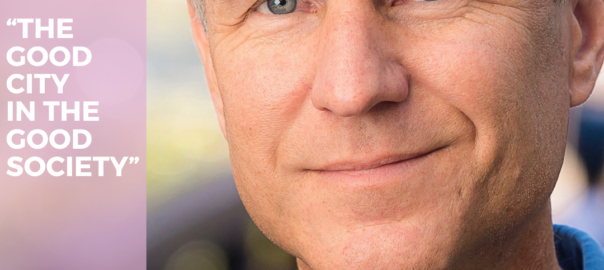
Public Lecture by 6th Vienna Karl Polanyi Visiting Professor Lane Kenworthy!
PUBLIC LECTURE BY LANE KENWORTHY
"The good city in the good society"
November 21st, 2023
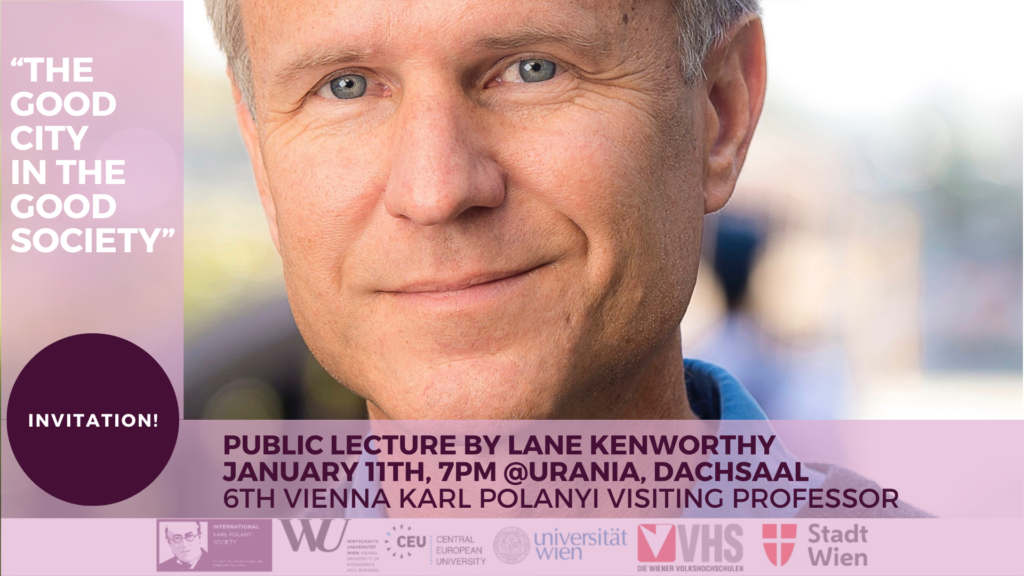
Public lecture by Lane kenworthy"
On January 11th, 2024 the Vienna Karl Polanyi Visiting Professorship will be awarded for the sixth time. This semester’s Visiting Professor Lane Kenworthy will hold his Public Lecture in the Dachsaal at the Vienna Urania.
Kenyote: The Good City in the Good Society
“Many people like living in or close to cities, and in nearly all parts of the world more are heading there. This is a good thing, because density has significant benefits, including economic productivity, economies of scale in the provision of public goods and services, tolerance, and environmental sustainability.
There are a number of challenges we — citizens, researchers, policymakers — will need to meet: in capability development, provision and maintenance of infrastructure, safety, economic security and prosperity, housing, transportation, health, political decisionmaking, and financing.
The good news is that we know a lot about how to meet these challenges. There are feasible, affordable policies and institutions that can allow and encourage more people to live in or near cities and thereby facilitate better lives for themselves and for others. This isn’t just theoretical: these policies and institutions are already in use in actually-existing cities, and there is substantial evidence that they work.”
We are looking forward to seeing many of you there and kindly ask you to register!

Invitation to Register
Invitation to register for the conference in linz dec 4th-6th
November 14th, 2023
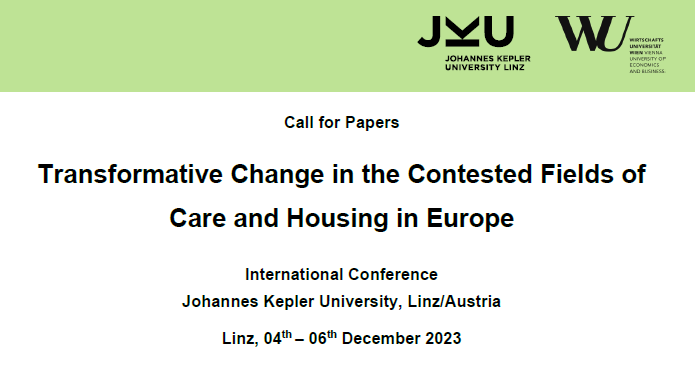
INVITATION TO Register to participate by Nov 30th
Care and housing are foundational for human well-being. Both deal with organising and
sustaining livelihoods: while care as a human activity reacts to the ever-given contingency
of life, housing arranges a place for undertaking everyday need-satisfying activities. In both
fields, crises have exacerbated over the last decades, manifesting in care gaps, labour
and care migration, and precarious working conditions of care workers, respectively in
overburdening costs due to the transformation of homes into assets, leading to
gentrification and segregation. Despite being seldomly investigated together, care and
housing as well as their related crises are co-constitutive.
From the 1990s onwards, two simultaneous tendencies can be observed in European care
regimes and housing systems. On the one hand, neoliberal reforms have aimed at
privatisation, commodification, marketisation, and financialisaton. This has rearranged
welfare states, promoting variegated forms of capitalism. Allegedly singular events like the
global financial crisis, subsequent austerity measures, the Covid-19 pandemic, and the
current cost of living crisis have furthermore deepened structural problems of access and
affordability. This has led to increasing socioeconomic and spatial polarisations as well as
social inequalities in the relations of gender, race, and class. On the other hand, these
developments have transformed the provision of care and housing into a contested terrain
leading to labour disputes and struggles, such as care protests, or initiatives for
expropriating institutional investors. The wide range of community-based or infrastructural
projects has to be seen against the backdrop of the increasing search for alternative care
and housing provision. On top of that, rapid technological developments and climate
change further accelerate the reorganisation of care and housing arrangements and
practices built up by all parties involved in both contested fields.
Given these multiple transformations, the conference “Transformative Change in the Contested Fields of Care and Housing in Europe” seeks to analyse the contemporary developments in care regimes and housing systems and respective configurations of care
and housing.
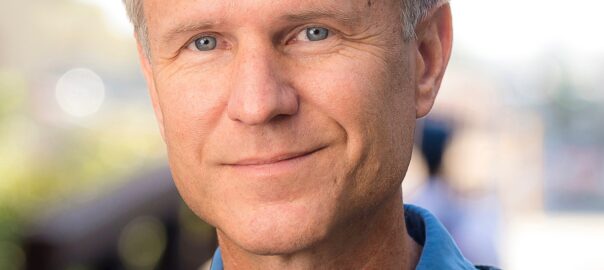
We welcome 6th Vienna Karl Polanyi Visiting Professor Lane Kenworthy
lane kenworthy is our 6th visiting professor
October 1st, 2023
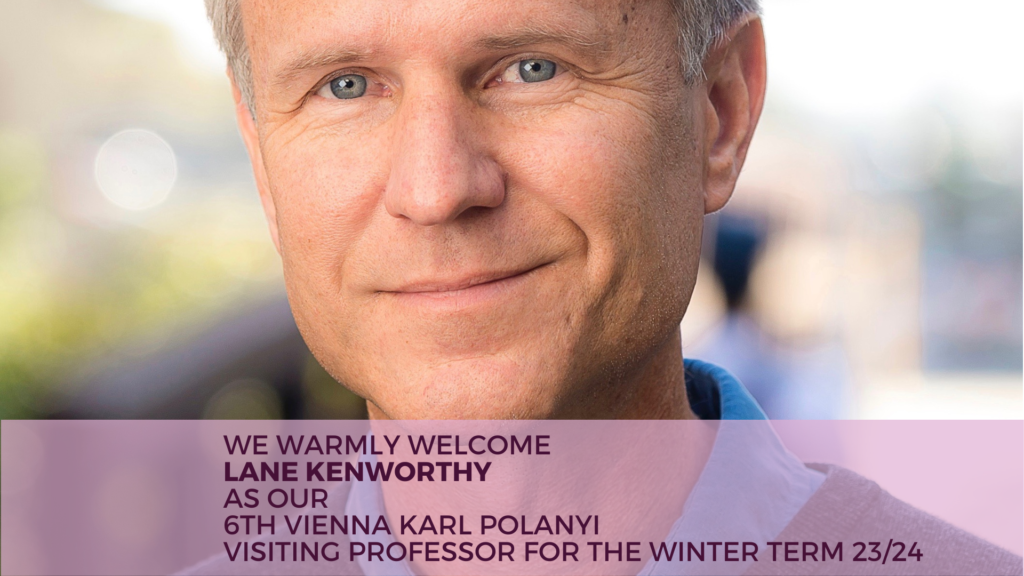
we warmly welcome lane kenworthy!
It is our pleasure to introduce to you our 6th Vienna Karl Polanyi Visiting Professor Lane Kenworthy.
He is Professor of Sociology & Political Science and Yankelovich Chair in Social Thought at the University of California-San Diego. As a sociologist and political scientist, he is examining the economic effects of income and wealth distribution and works on the welfare-state, transformation towards increased social and economic security and equal opportunity. We are very much looking forward to his teaching in the Vienna Karl Polanyi Visiting Professorship Research Seminar and the Public Lecture he will hold on January 11th in Vienna.
We will soon inform you about his stay in Vienna, his Public Lecture in January and the CEU Workshop!

This year’s Webinar Series on “Decent Care”
THIS YEAR’S WEBINAR SERIES ON “DECENT CARE”
Shaping provisioning systems for social-ecological transformation: DECENT CARE FOR ALL WITHIN PLANETARY BOUNDARIES
Fall 2023 Webinar Series
15th August, 2023
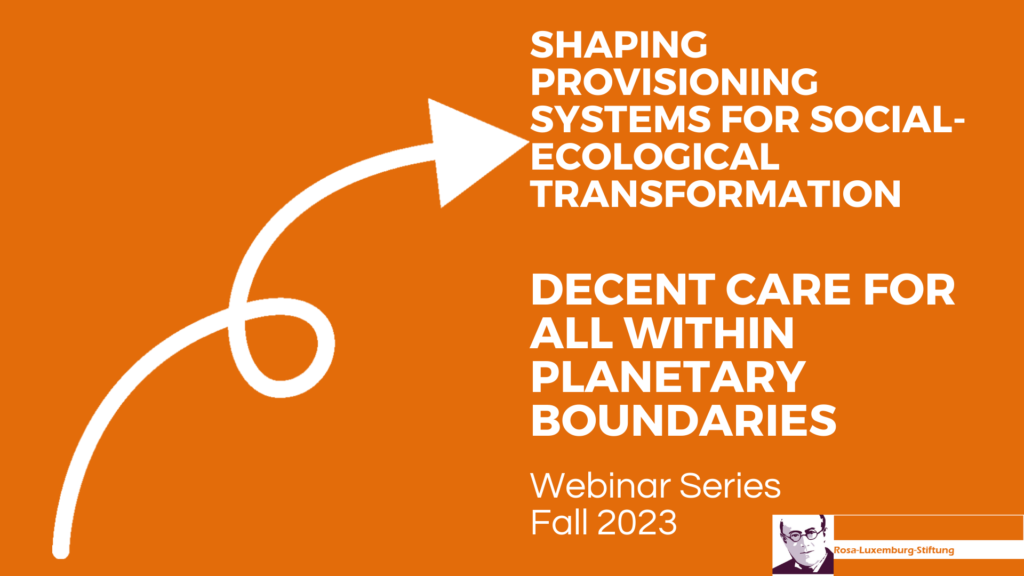
The Fall 2023 Webinar Series puts the inclusive, resilient and sustainable provisioning of care for all within planetary boundaries into focus. It takes stock of pioneering work and recent approaches at the intersection of feminist and ecological research and foregrounds the relevance of care in addressing the ecological crisis. Taking lessons from the pandemic, the continued care crisis, and the aggravating climate crisis, the basic provision of care has to be given priority over other economic activities, for example economic activities in the FIRE (finance, insurance, real estate) and, more generally, over ecologically detrimental sectors. An increasing awareness of human interdependence with the environment raises new questions about how care can be defined, who is included in a caring society, and how good care for all within planetary boundaries can actualise.
Over the course of four webinars we will debate how to shape provisioning systems for a social-ecological transformation of the care sector with experts of the respective fields.
Dates
September 13th 2023, 6 pm (CET)
October 11th 2023, 6 pm (CET)
Transition towards a Caring Society
November 8th 2023, 6 pm (CET)
Decent care for all within Planetary Limits
November 22nd 2023, 6 pm (CET)
Transformative Change and changing Societies – Deindustrialization, Digitization, Planetary Boundaries and Care
Organized by:
Institute for Multilevel-Governance and Development (WU Vienna);
Institute for Ecological Economics (WU Vienna);
International Karl Polanyi Society
Kompetenzzentrum Alltagsökonomie
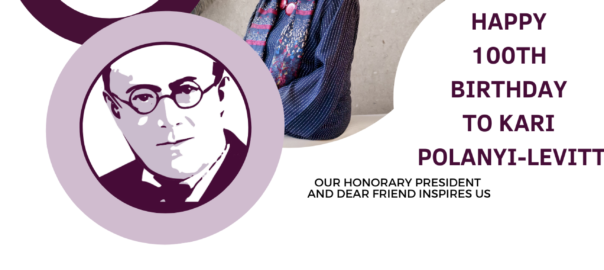
Happy 100th Birthday Kari Polanyi-Levitt!
KARI POLAYNYI-LEVITT's 100th BIRTHDAY
June 14th, 2023
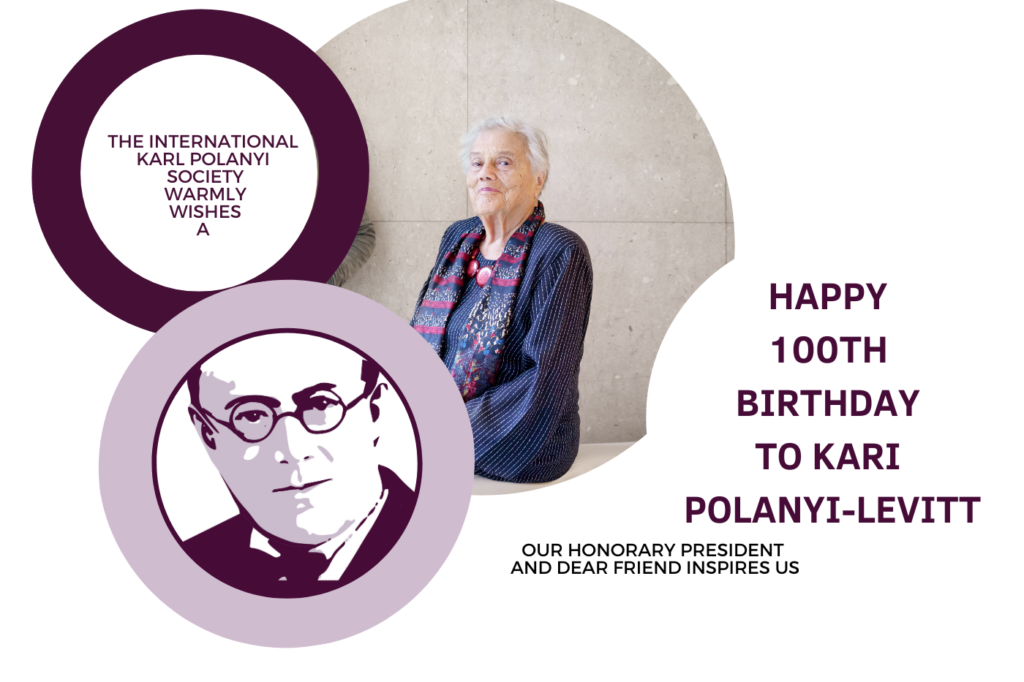
what a reason to celebrate!
You will find all the material from today’s celebatory conference hosted by our Board Member Margie Mendell, longtime collaborator and friend of Kari Polanyi-Levitt at the Karl Polanyi Institute of Political Economy at Concordia university in Montéal here.
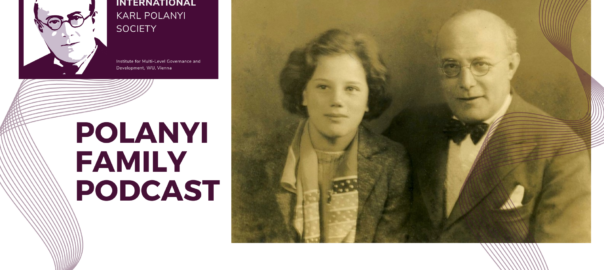
Polanyi Family Podcasts
Polanyi family podcasts
In celebration of Kari Polanyi-Levitt’s 100th birthday on June 14, 2023 the International Karl Polanyi Society is releasing a podcast series on multiple members of the Polanyi family. Find out more about the lives and work of Karl Polanyi, Ilona Duczyńska Polanyi, Kari Polanyi-Levitt, Michael Polanyi, Laura Polanyi Stricker and Eva Zeisel – from the personal to the political, the academic to the activist.
- How did Karl Polanyi’s political views change over the years?
- How did the upheavals of the 20th century shape lona Duczyńska Polanyi’s political activism?
- What did Kari Polanyi-Levitt research in the Carribean?
- How did Michael Polanyi’s contribute to the Philosophy of Science?
- What was it like for Eva Zeisel to become a ceramicist in 1920s Hungary?






